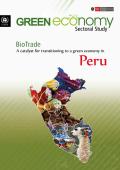
The main purpose of the study is to build a framework that will strengthen Peru’s BioTrade-related national programmes and will serve as a catalyst for the country’s transition to a green economy. The study bases its analysis on a review of the most relevant existing literature on BioTrade and on an extensive consultation process with stakeholders involved in the development of BioTrade in Peru (e.g. specialists, policy-makers, donors, commercial investors).
This study will be a useful resource for policy-makers, such as the Ministry of Economy and Finance, the government authority that draws policies regarding the creation of incentives to improve the environment for additional investment opportunities. The study offers suggestions, including the use of financial and economic instruments, to promote further growth of the BioTrade sector. The study also supports the National BioTrade Commission’s efforts to build a better public understanding of BioTrade and to raise the general awareness about the sector within the Peruvian society.
UNEP’s Green Economy initiative is about meeting the multiple challenges on a planet of six billion people rising to over nine billion by 2050, by maximising the impact and opportunities of different investment choices in order to globally propel low carbon, resource efficient growth.
Encouraging financial flows between rich and less well-off countries is key as is the involvement of the private finance sector and global investment community. UNEP has been actively engaged with financial institutions around the world for over 15 years to facilitate more sustainable investment patterns.
This report focuses on the kinds of public finance mechanisms needed to incentivise and scale-up private sector investment.
Cities are home to more than half the global population and are responsible for 60 to 80 per cent of energy use and more than 75 per cent of carbon emissions. This report examines how cities can better access climate finance through the Clean Development Mechanism (CDM). It recommends reforming the existing CDM to allow for methodologies geared towards cities. It also recommends the development of a CDM programme of activities for pilot cities that would inform the future development of Nationally Appropriate Mitigation Actions (NAMAs) and assist in the transition to a green economy.
This publication, by UNEP, aims to identify the challenges faced in attempting to decouple human well‐being from resource consumption and exists as the first report amongst many investigations into decoupling which will be undertaken by the International Resource Panel and UNEP over the next few years. The report offers facts and statistics of natural resource flows and trade globally and notes that consumption of natural resources is still rapidly rising. A series of country wide case studies (Germany, South Africa, China and Japan) are presented that examine the decoupling potential of the countries in question. The report observes that developed countries appear to show stabilisation of resource and energy consumption however these economies appear to have exported the more energy and resource intensive elements elsewhere. There appears to be some success of relative decoupling (where resource intensity per unit growth falls) in developing countries but resource consumption in these economies is ‘steeply on the rise’.
The Design for Sustainability (D4S) concept outlines methodologies for making sustainable improvements (social, economic and environmental) to products by applying elements of life cycle thinking. D4S builds on the work of ecodesign to include economic and social concerns, and its methodology includes both incremental and radical innovation. The United Nations Environment Programme and the Delft University of Technology, the Netherlands, in concert with key partners, work to support, illustrate, and diffuse targeted D4S demonstration efforts, including the European Commission-funded Cleaner Production for Better Products project in Vietnam, that are needed to change unsustainable consumption and production patterns.
